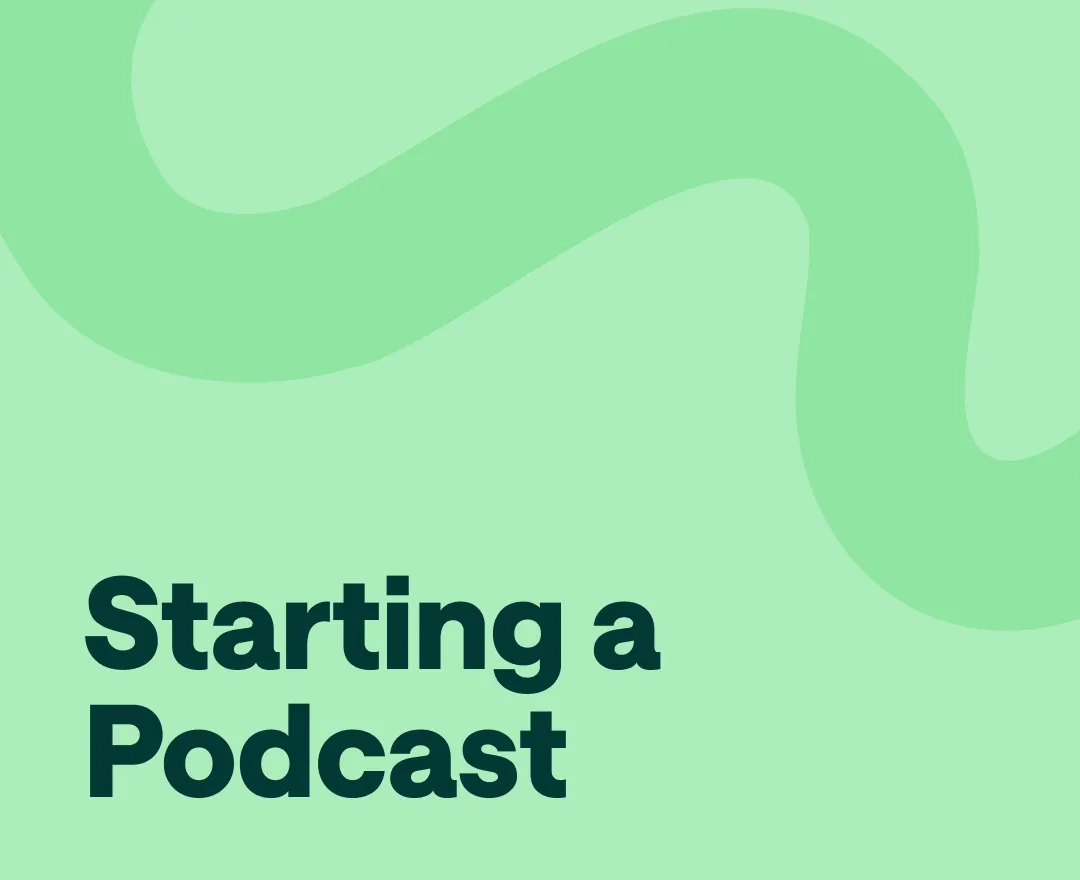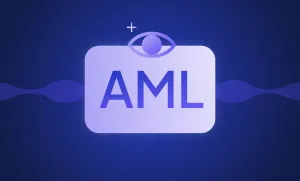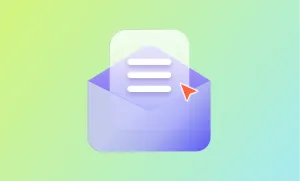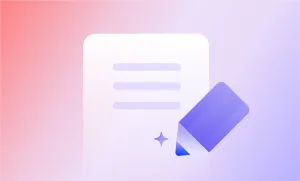Let us guess. You've likely been looking into the world of podcasting for a bit, and now you're eager to give it a try.
But, here's the thing – your budget is tight. You might have noticed that some podcasters have fancy recording setups and expensive microphones, and it's making you wonder if you can start a podcast without spending a dime.
If that's what's on your mind, you're in the right place. In this blog post, we'll show you how to begin a podcast for free and, more importantly, how to make it really good!
Here’s what we’re going to cover in a few brief steps:
How to Start a Podcast for Free
- Come up with a unique idea to stand out from the crowd and build an audience.
- Use existing tech that you own (e.g. your laptop microphone) and free-to-use audio recording and editing software.
- Find a free hosting service for your podcast.
- Find a monetization model that works for you, e.g. ads, subscribers or merchandise.
Now let's get into more detail with actionable tips and strategies to create your content, find the right software and equipment and how you can make money podcasting!
Crafting Unique Content for Your Podcast
Alright, let's face it, there are podcasts about pretty much everything out there. So, when you're just getting started, you're jumping into a seriously competitive field. Now, how do you make your content stand out in the crowd? The good news is, coming up with original ideas doesn't cost a dime, and we're here to walk you through the process.
The Importance of Standing Out in the Crowded Podcast World
The podcast market is filled with a wide array of content, from true crime to self-improvement, comedy, history, and more. To succeed, you must find your unique voice and carve out your own niche. Here's why differentiation is crucial:
Podcast listeners are demanding: With countless options at their fingertips, listeners are increasingly selective. To capture their attention, your podcast must offer something distinctive.
Competition is fierce: Established podcasts often dominate popular genres. To break into these spaces, you need a fresh angle, a unique perspective, or an innovative approach.
Staying power: Over time, your distinctiveness becomes your brand. Listeners will remember your podcast for its unique qualities, leading to a loyal fan base.
Brainstorming Techniques for Innovative Podcast Ideas
So, how do you come up with a podcast idea that not only grabs your audience's attention but also sets you apart in the competitive podcasting landscape and keeps your listeners coming back for more? For those of you who are still wondering what your podcast should even be about, we're here to help you with some brainstorming tips.
The Reverse Approach: Instead of starting with a topic, begin with the outcome you want to achieve. Ask yourself, "What do I want my listeners to feel or learn after each episode?" Then work backward to identify the content that would deliver that outcome.
The Tangential Twist: Take a seemingly unrelated topic or idea and try to connect it to your primary theme. Sometimes, the most unique ideas arise when you explore the intersections between different concepts.
The 5-Whys Technique: Inspired by the concept of root cause analysis, ask yourself "why" at least five times when brainstorming. For instance, if you want to create a podcast about history, ask why you're interested in history, and keep digging deeper until you uncover a more specific and unique angle.
Random Word Association: Pick a random word or object and try to connect it to your podcast concept. This can lead to creative and unexpected connections that spark innovative ideas.
The 'What If' Game: Imagine various scenarios or alternative histories related to your chosen theme. For instance, if your podcast is about technology, ask, "What if smartphones were never invented?" These imaginative scenarios can inspire unique content ideas.
The 'Micro to Macro' Expansion: Start with a micro-level idea and gradually expand it to a broader concept. For example, if your micro-idea is "spaghetti," you might expand it to "Italian cuisine" and eventually reach the broader theme of "world cuisine." This method can help you find a unique angle within a popular genre.
Guest Perspective Podcasting: Instead of always being the host, consider flipping the script and inviting your audience or other podcasters to suggest episode ideas or even host an episode. This not only fosters community engagement but also brings in fresh perspectives.
Exploration Through Visuals: Explore art, photographs, or visual content related to your niche. Sometimes, a powerful image can spark an entirely new perspective or story idea for your podcast.
Historical Time Travel: Dive into history, but focus on specific historical events or eras that are less explored. For example, if your niche is history, you could delve into "The Forgotten Stories of the Roaring Twenties" or "Unearthed Secrets of Ancient Egypt."
Predicting the Future: Explore speculative content. Share your vision of the future within your podcast's niche, whether it's the future of technology, fashion, or society. Engaging with these "what if" scenarios can pique curiosity.
Finding Your Niche, Target Audience, and Creating Your Listener Persona
Your niche is like your spot in the podcasting world, and your target audience is the group of people who'll dig your content. Here's how to figure them out:
Niche: This is a focused area within your chosen genre. It could be something like "unsolved mysteries in true crime" or "history with a twist of food." The more specific, the better.
Target Audience: Your target audience is the people who are most likely to be into your stuff. Think about their age, interests, and how your podcast can help them out.
Creating a listener persona is a crucial step in shaping your podcast's success. By understanding precisely who your target audience is, you'll be better equipped to craft episode ideas that resonate with them. Fortunately, building your listener persona is a free and straightforward process. All you need is a clear understanding of what a listener persona is and how to go about creating one. Here's a concise guide to help you get started!
How to Create Your Listener Persona
A listener persona, also known as an audience persona, is like a character sketch of your ideal podcast listener. This fictional representation helps you understand and cater to the needs, interests, and behaviors of your target audience. Building a listener persona is an essential step in developing a successful podcast because it guides content creation, promotion, and engagement strategies. Here's how to create your listener persona:
1. Define Demographics:
Begin by collecting demographic information about your target audience. Demographics include age, gender, location, education level, income, and occupation. Knowing these details helps you tailor your content to the specific interests and needs of your listeners. For example, if your podcast targets tech-savvy millennials, your content and style may differ from one targeting middle-aged professionals.
2. Explore Interests and Hobbies:
Dive into the interests, hobbies, and passions of your potential listeners. Consider what topics, activities, or communities they engage with. Do they love travel, cooking, sports, or DIY projects? Understanding their interests allows you to create content that aligns with their lifestyle.
3. Identify Pain Points and Needs:
What challenges, questions, or problems might your audience be facing? By identifying these pain points, you can develop content that addresses their specific needs. For example, if you're running a podcast about personal finance, your audience's pain points might include debt management, saving for retirement, or budgeting.
4. Discover Media Consumption Habits:
Understand how your target audience consumes media. Do they prefer podcasts, audiobooks, blogs, or videos? Knowing their media consumption habits helps you choose the right format and platforms for your podcast.
5. Define Communication Preferences:
Consider how your audience prefers to communicate. Are they more active on social media, email, forums, or other channels? Knowing their preferred communication methods enables you to engage with them effectively and build a community around your podcast.
6. Segment Your Audience:
Recognize that your potential audience may consist of various segments with different needs and preferences. You may have multiple listener personas if your podcast covers diverse topics. Segmenting allows you to create content and messaging tailored to each group.
7. Give Your Persona a Name and Face:
Personalize your listener persona by giving it a name and even a fictional profile picture. This makes it easier to relate to and keep in mind as you create content. For instance, you might have "Samantha," a 30-year-old urban professional, as your listener persona.
8. Validate Your Persona:
Once you've built your listener persona, validate it with data. Conduct surveys, gather feedback, and analyze your audience's engagement to ensure that your persona aligns with your actual listeners.
9. Adapt and Evolve
Audience personas aren't static. As your podcast grows and evolves, your listener persona may need adjustments. Stay attuned to changing trends and shifts in your audience's preferences.
Tips for Making Your Content Engaging
Finally, to captivate your audience and keep them coming back for more, consider these engagement tips:
- Tell a Good Story: Whether it's sharing personal stories, interviewing guests, or sharing facts, tell your tales well. People love a good story.
- Good Audio Quality: Even if you're on a tight budget, aim for good audio quality. Clear sound makes a big difference.
- Stick to a Schedule: Be consistent with your release schedule. It builds anticipation and keeps your audience coming back for more.
- Chat with Your Audience: Engage with your listeners. Respond to their comments and questions. Building a community around your podcast is a big plus.
- Try Different Formats: Don't be afraid to experiment with different podcast formats. You can go for a variety show, narrative style, interviews, or mix 'em up.
- Team Up and Promote: Partner with other podcasters in your niche. Cross-promote each other's episodes and maybe even guest on each other's shows. It can help you reach more ears.
- Learn and Adapt: Pay attention to what's working and what's not. Be ready to tweak your content based on listener feedback and changing trends.
Cover The Technical Aspects (For Free!)
Now, let's dive into the technical aspects of launching your podcast. Every podcast production revolves around three essential components:
-- Recording equipment
-- Editing software
– A hosting provider
But how can you manage all three of these without spending a penny? Here are our suggestions!
Recording Equipment
You don't need to wipe your savings to secure the necessary recording equipment for your podcast. Here's how to get started without spending a penny:
1. Use Your Laptop's Built-in Microphone
Most laptops come equipped with a built-in microphone that can deliver decent sound quality. While it may not provide professional-grade audio, it's more than sufficient for beginners. Ensure you're in a quiet environment and reduce background noise during recording.
2. Repurpose Your Existing Headphones
Chances are, you already have a pair of headphones or earbuds. These can serve as your podcasting headphones. They'll help you monitor your audio while recording and editing. If you have a microphone attachment, even better!
4. DIY Soundproofing
To improve audio quality, consider creating a makeshift soundproofing setup. You can use household items like blankets, pillows, or even arrange your recording space in a way that minimizes echo and external noise.
Free Recording Studio from Podcastle
Now when it comes to recording software, Podcastle offers an online recording studio that comes at no expense and ensures your audio sounds like it was produced in a professional studio. Additionally, it features an AI-powered background removal tool that eliminates all background noise and enhances audio quality, ensuring your podcast maintains a top-notch sound.
Editing Software
Podcast editing software plays a pivotal role in the podcasting process. It's the digital toolbox that podcasters use to refine, enhance, and craft their audio content into a professional and engaging final product.
Why do podcasters need editing software?
Audio Cleanup: Editing software helps to eliminate background noise, adjust audio levels, and remove any glitches or unwanted pauses. This ensures that your podcast sounds crisp and clear.
Seamless Editing: Podcasters can cut, rearrange, and merge audio segments to create a seamless flow. This allows for the removal of mistakes, repetitions, or irrelevant content, making your podcast more polished.
Add Music and Effects: Editing software allows for the integration of background music, sound effects, and jingles, enhancing the overall listening experience and adding depth to your podcast.
Professional Touch: By using editing software, podcasters can add intros, outros, and transitions, giving their podcast a professional touch and reinforcing their brand.
Free Audio Editor from Podcastle
Podcastle offers a top-tier podcast editing software that stands out for several reasons and offers a free plan, making it budget-friendly for newcomers. With Podcastle, you can effortlessly enhance your podcast's audio quality, even if you're a beginner.
Here are some key features that make Podcastle a standout choice:
Music and Sound Effects Library: Access a vast library of music and sound effects to elevate your podcast with the perfect audio backdrop.
Text to Speech Converter: Easily convert written content into spoken words, opening up new possibilities for your podcast.
User-Friendly Interface: Podcastle is designed with user-friendliness in mind, making it accessible to podcasters of all experience levels.
A Hosting Provider
Podcasting is not just about recording and editing; it's also about delivering your content to your audience effectively. This is where podcast hosting providers come into play. Let's delve into what podcast hosting is, why it's essential for podcasters, and how Podcastle's free hosting hub provides a viable solution.
What is Podcast Hosting?
Podcast hosting is a specialized service that stores and distributes your podcast files to a global audience. When you record and edit your podcast, it generates audio files, and these files need to be stored securely and efficiently. Podcast hosting providers offer this essential storage space, ensuring that your content remains accessible to listeners worldwide.
Why Do Podcasters Need Hosting Providers?
Reliable File Storage: Podcasters generate large audio files for each episode. Hosting providers ensure these files are securely stored, preventing loss or corruption.
Global Distribution: Hosting providers use Content Delivery Networks (CDNs) to ensure fast and reliable delivery to listeners, regardless of their location.
Scalability: As your podcast grows, so does your storage and bandwidth needs. Hosting providers can scale their services to accommodate your growing audience.
Accessibility: Hosting providers generate an RSS feed that allows your podcast to be listed on directories like Apple Podcasts, Spotify, and Podchaser.
Podcast Hosting from Podcastle
Podcastle recently launched its free podcast hosting service which offers a seamless and professional podcasting experience for creators of all levels. With Podcastle's Hosting Hub, you can effortlessly publish your content on major podcast networks, including Apple, Spotify, Podchaser, and more, all from a single platform.
The process is incredibly user-friendly, allowing you to create, edit, and publish your episodes without the hassle of transferring files or juggling multiple tools. You can also obtain your RSS feed and a dedicated page for your show on Podcastle's website, which can be easily shared with your audience or embedded on your own site.
Podcastle makes it simple to bring your podcast to life, and with just three easy steps, you can host and publish your content for the world to enjoy.
How to start a podcast for free and make money
Starting a podcast without breaking the bank is entirely possible, but turning that free podcast into a source of income requires some strategic thinking. Here, we'll explore practical steps and tips for monetizing your podcast without upfront costs, making your venture not only enjoyable but also financially rewarding.
Select the Right Monetization Model
While the podcasting industry offers various ways to make money, you should choose the model that best aligns with your content and audience. Here are some options:
Sponsorships and Advertisements: Attract sponsors relevant to your niche and audience. Platforms like Anchor and Podbean often offer ad opportunities even for small podcasts.
Affiliate Marketing: Promote products or services related to your podcast's content using email software for affiliate marketing and earn a commission on sales generated through your unique affiliate links.
Listener Support: Platforms like Patreon and Buy Me a Coffee enable your listeners to support your podcast with donations in exchange for exclusive content or perks.
Sell Merchandise: Design and sell branded merchandise (t-shirts, mugs, stickers, etc.) related to your podcast.
Offer Premium Content: Create a paid subscription service for exclusive or early-access content.
Crowdfunding: Use platforms like Kickstarter or Indiegogo to fund special projects or seasons.
Build a Loyal Audience:
Your listener base is your most valuable asset when it comes to making money. Focus on producing high-quality, engaging content that keeps your audience coming back for more. Engage with your listeners through comments, questions, and feedback to foster a sense of community.
Establish a Strong Online Presence
Promote your podcast and engage with your audience on social media platforms. Join podcasting forums and communities to network with other podcasters and potential sponsors.
Consistent Release Schedule
Keep a consistent schedule to build anticipation and reliability with your audience. Knowing when to expect new episodes will encourage them to tune in regularly.
Networking and Collaboration
Collaborate with other podcasters, guests, or influencers in your niche to reach a broader audience. Cross-promotion can help attract new listeners and potential sponsors.
Leverage Free Marketing
Utilize free marketing strategies, such as content marketing, social media marketing, and email marketing, to promote your podcast. Write blog posts or articles related to your podcast topics, share engaging snippets on social media, and build an email list to stay in touch with your audience.
Measure Performance and Adjust
Use analytics and listener feedback to understand what works and what doesn't. Adapt your content and monetization strategies accordingly. Experiment with different monetization methods to find what resonates best with your audience.
Think Long-Term
Building a profitable podcast takes time. Be patient and persistent in your efforts to grow your audience and monetize your content effectively.
In the vast realm of podcasting, where countless voices echo in the digital soundscape, breaking through the noise and crafting a unique space for your content is both an exhilarating challenge and a necessity. As a burgeoning podcaster, your journey begins amidst fierce competition and seemingly endless choices. The good news is that ingenuity doesn't require a hefty budget. In this article, we'll guide you through the art of crafting distinctive content that captures the essence of your vision and, ultimately, makes your podcast stand out in the crowd.
Final Thoughts
So, there you have it! Starting a podcast is simple with AI podcast software that saves time and effort. Keep your audience engaged, explore different ways to make some money down the road, and don't forget – your unique voice is the real star here.
Your podcast adventure may start off quietly, but with a pinch of creativity and patience, it can grow into something truly awesome. So, grab that microphone (or just your laptop), hit the record button, and dive into the exciting world of podcasting!
FAQ
How to start a podcast for free on Spotify?
Starting a podcast for free on Spotify is a breeze. All you need to do is create an account on Spotify for Podcasters, upload your podcast episodes, and you're good to go. Spotify offers free hosting and distribution, making it accessible for podcasters without any cost.
How to start a podcast for free on Apple?
To launch your podcast for free on Apple Podcasts, you'll need to follow these steps: Create your podcast content. Set up a podcast hosting provider like and submit your podcast to Apple Podcasts through your hosting platform. Once approved, your podcast will be available to listeners on Apple Podcasts for free.
How to start a podcast for free on Android?
Starting a podcast for free on Android is similar to starting one on Apple. You can follow these steps: Create podcast content. Use a free hosting platform. Distribute your podcast through various Android podcast apps like Podchaser and Spotify, which offer free hosting and distribution.
How to start a video podcast for free?
Creating a video podcast for free is doable with these steps: Plan your video content and set up a free YouTube channel. Record your podcast using video recording equipment like a smartphone or webcam. Edit your video podcast using free video editing software and upload it to YouTube.
How to start a podcast with 2 people for free?
Starting a podcast with two people for free is not only possible but can be a fantastic collaborative experience. You and your co-host can work together to brainstorm and plan your podcast's content, bringing your unique perspectives and ideas to the table. Collaborating on the content, selecting topics, and defining the format can lead to dynamic and engaging episodes.








